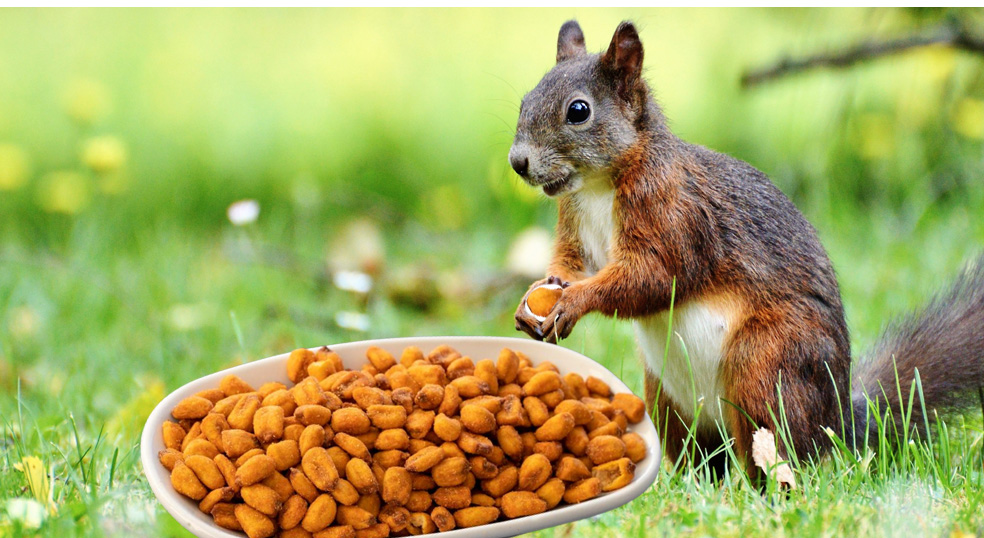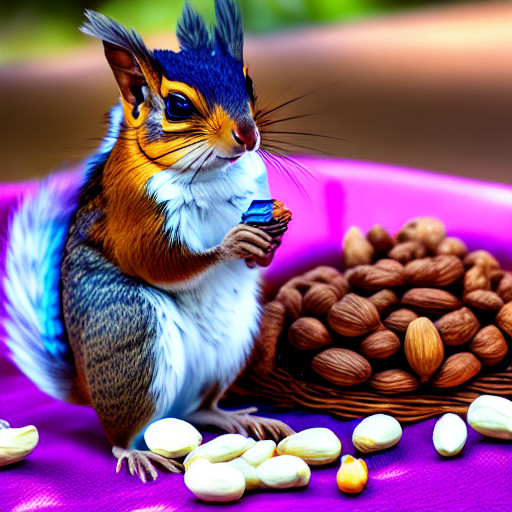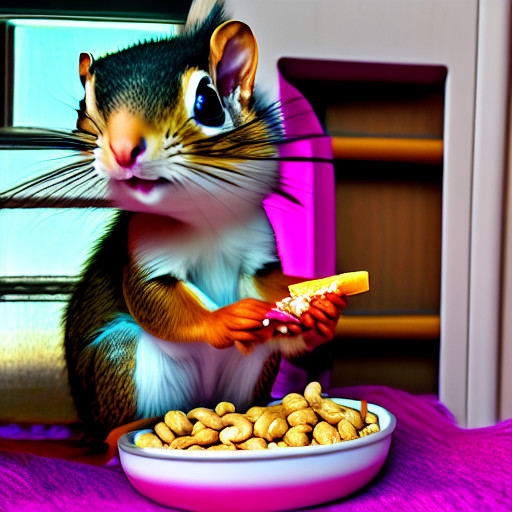Is it Safe for squirrels to eat salted peanuts? Squirrels, on the other hand, have a natural desire for nuts, berries, and other vegetation in their environment. Please don’t feed them any form of salted nuts.

CAN SQUIRRELS EAT SALTED PEANUTS? Squirrels can handle a modest quantity of salt, but their kidneys are unable to filter out the huge amount of sodium in salted nuts.
If you’re not sure if peanuts, pecans, hazelnuts, almonds, or walnuts are salted, give them a taste before feeding them to your children. Because I indicated, they can tolerate a small amount of salt, but you don’t want to overfeed them.
Before you start feeding your garden squirrels, there are a few things you should know. First and foremost, you must comprehend the effects that various nutrients have on a squirrel’s mind and body.
Other things, besides nuts, are required to provide them with a more balanced diet.
Carrots, pecans, and, in most cases, peanuts and peanut butter are among the additional meals.
Peanuts are one of the most popular snacks all over the world. Peanuts are eaten and enjoyed by squirrels as well, but are they healthy for them? Raw, roasted, or salted peanuts, perhaps? What are the advantages of feeding squirrels peanuts, and are there any health hazards involved? Let’s look at it more closely.
Are Peanuts Good for Squirrels?

Fresh vegetables, wild meals from the outdoors, and restricted amounts of nuts and snacks are all part of a squirrel’s balanced diet. Peanuts are a pleasant treat to offer and a terrific method to aid with bonding, but they should only be given in little amounts after they’ve eaten a good meal.
Squirrels don’t have a lot of preferences when it comes to food. And squirrels appear to think that eating peanuts is a no-brainer. Peanuts, contrary to popular belief, are legumes, not nuts. Soy, beans, and lentils are more closely connected to them.
Squirrels don’t eat peanuts since they aren’t particularly nutritious. So, to bond with the wildlife in your garden, offer them healthy things first and utilize peanuts only as a fun treat. If you’re going to offer them peanuts, do it as a treat now and then to keep their diet varied.
Let’s have a look at the many types of peanuts available commercially and their nutritional data before we get into the health dangers of feeding peanuts to squirrels.
What are the Different Types of Peanuts?
The four most prevalent types of peanuts are Runner, Virginia, Spanish, and Valencia. Each is unique in terms of size, flavor, and nutritional content. There are various commercially grown variations of each of these four categories.
1. Runner Peanuts
These are the most well-known and widely used. The flavor and perfume of runner peanuts are very wonderful. Peanut butter is made from its homogeneous kernel size, which ensures even roasting.
In a warm environment with well-drained sandy soil, runner peanuts provide the highest yield. Georgia, Texas, Alabama, Florida, South Carolina, and Oklahoma are the most common places to find them.
2. Virginia Peanuts
The Virginia peanut, often known as the “ballpark” peanut or “cocktail nut,” is the largest of all peanuts. Because of its greater size, it’s ideal for processing, particularly salting, confections, and in-shell roasting.
Southeastern Virginia and northeastern North Carolina are the primary producers of Virginia peanuts. They can also be found in West Texas and areas of South Carolina.
3. Spanish Peanuts
The Spanish peanut is distinguished by its smaller kernels and reddish-brown skins. Peanut chocolates, peanut snacks, salted peanuts, and peanut butter all include them.
Spanish peanuts have a higher oil content than other peanut varieties, making them ideal for oil extraction. They’re mostly grown in Oklahoma and Texas.
4. Valencia Peanuts
Three or more kernels per shell are found in Valencia peanuts. These are also the tastiest of the four varieties.
Peanuts are commonly sold in their shells and used to make peanut butter. They can also be cooked or roasted. New Mexico produces the majority of the valencia peanuts.
Do Peanuts Have Any Nutritional Value?
Peanuts are not connected to the nut tree, even though they have the word “nut” in their name. They are related to beans, soy, and lentils and are classified as legumes.
Peanuts are abundant in lipids, most of which are mono and polyunsaturated. As a result, they’re usually used in the production of peanut butter.
They include a lot of plant-based proteins. Peanuts, like several other plant-based proteins, can induce allergic reactions in people and animals, including squirrels.
Peanuts have a low glycemic index due to their low carb content.
Potassium, phosphorus, magnesium, copper, and manganese are all abundant in peanuts. In addition, peanuts are high in B-vitamins.
Peanuts are available in a variety of ways, including raw, salted, spiced, roasted, and more. Keep in mind that nutritional levels vary by variety and may not be suitable for squirrels.
Read Also: My cat ate a squirrel, what you need to know
Can Squirrels Eat Salted Peanuts?
Squirrels and rabbits are poisoned by any type of salted food. Squirrels do require a small amount of sodium to keep their electrolyte balance in check. High salt concentration, on the other hand, hurts renal function and can lead to kidney disease.
If you’re not sure if the peanuts you bought are salted, give them a taste before you feed them to the squirrels. However, make sure the squirrels have access to fresh water.
Can Squirrels Eat Raw Peanuts?
Squirrels should not eat raw peanuts for various reasons. Peanuts are grown underground, even though they are not harmful. They could be contaminated with Aspergillus flavus, a mold that generates aflatoxin, a carcinogen, during harvesting. This toxin can potentially result in liver failure and cancer.
Flavonoids are a known cause of liver cancer, reduced immunity, poor protein metabolism, and death in animals, according to a study from MIT’s Department of Nutrition and Food Science.
Some of the toxins are removed by roasting or frying peanuts, while aflatoxin remains intact even at high temperatures.
Peanuts also contain a trypsin inhibitor, which prevents the pancreas from producing trypsin. This enzyme is important for protein reabsorption.
In conclusion, you should never feed raw peanuts to squirrels.

Can Squirrels Eat Dry Roasted Peanuts?
Raw, roasted, or salted peanuts are always a source of concern for animal lovers. The crucial question is whether roasting removes toxins from peanuts. Roasting, according to experts, does not remove the poisons.
Another issue to consider is that there are two varieties of roasted peanuts: dry roasted and oil roasted. The sodium content of dry-roasted peanuts is higher, whereas oil-roasted peanuts are high in calories.
Squirrels don’t like dry-roasted peanuts, either.
Can Squirrels Eat Peanut Butter?

Squirrels are attracted to peanut butter, much as they are to peanuts.
Peanut butter may also include aflatoxins, which can cause liver problems, blood coagulation problems, immune system problems, protein synthesis problems, and potentially cancer.
Trans-fatty acids are another dangerous toxin. Peanut butter is created by a process known as hydrogenation, which improves food stability and extends shelf life. However, chronic disorders such as diabetes and heart disease can be caused by this. That means you shouldn’t feed peanut butter to squirrels.
Xylitol or sugar is commonly found in peanut butter. Squirrels are poisoned by them, and even little doses can be lethal.
Chocolate is one of the ingredients in some peanut butter products, which should be avoided.
Herbicides also contain glyphosate, which is a hazardous chemical. Peanut farmers also use this as a pre-harvest spray. Plants absorb this toxin much faster when sprayed immediately before harvest, and cleaning it completely off the plant or nuts is impossible. This is yet another reason why squirrels should not be fed peanut butter.
Lectin is another potentially harmful element in peanut butter. In squirrels, lectin promotes inflammatory reactions. They affect gut cells, resulting in a leaky gut. Squirrels don’t like legumes since they have the greatest lectin content of any dietary group.
With so many dangers, it’s best not to feed squirrels peanut butter.
What are the Health Risks of Feeding Peanuts To Squirrels?
Peanuts are particularly harmful to squirrels for a variety of reasons.
- When ingested, the nuts can induce choking or gastrointestinal obstruction in young squirrels.
- Peanuts have a high-fat content, therefore feeding them to squirrels for longer periods of time can cause pancreatic issues.
- For squirrels, salted peanuts are heavy in sodium, and flavored peanut brands are primarily fillers and items that aren’t good for their guts. Their kidney function is also harmed by too much salt.
- It’s also worth remembering that peanuts are a common allergy in both humans and squirrels. Additionally, some squirrels are prone to severe allergic reactions.
- Despite the fact that squirrels enjoy peanuts and maize, they do not offer them any nutritional benefits. It is acceptable to feed them these items, but only in tiny amounts.
- Tree nuts such as walnuts, almonds, and hazelnuts are far superior alternatives. Salt and sugar, in particular, are poisonous to squirrels and should be avoided.
Do Squirrels Like To Eat Peanuts?
Peanuts are particularly enticing to squirrels. If you look closely, you should be able to see them scurrying around in the trees or on the ground, gathering peanuts to store for later.
Peanuts that have been shelled are preferred by practically all squirrel species. Shelled peanuts provide them with certain nutrition in addition to chewing activity. Keep in mind, however, that peanuts are unhealthy and should never take precedence over small insects, fruits, seeds, or fungi.
Do Squirrels Have Any Peanut Allergies?
Squirrels, like people, can be allergic to peanuts. Although peanut allergies in animals are uncommon, it is still a good idea to be cautious and mindful of symptoms.
Allergies to peanuts are usually moderate. Among the signs and symptoms are
- Reddened skin
- Itching
- Agitation
- In severe cases, difficulty breathing
Remember that squirrels, like other wild creatures, will consume just about everything they can get their hands on. They have evolved to be able to search for food. While feeding them may appear to be a generous gesture, you may not be doing them any favors. Especially if you feed them human foods or overfeed them.
In other words, because squirrels’ digestive systems aren’t the same as ours, human food could be fatal to them.
Having said that, it’s fine to give them some of their favorite goodies now and then. Pecans and peanuts are examples of this. But only offer them unsalted, unsweetened, unshelled peanuts on rare occasions. Fill the feeder with foods that supply all of their vital elements.
Conclusion
squirrel eats fruit.

Feeding wild squirrels can be a very soothing and rewarding experience. Learning about the proper things to feed squirrels, on the other hand, is critical, especially for their safety.
When it comes to eating, squirrels aren’t fussy. They’ll consume anything that looks like it could be a meal.
So feeding squirrels is a fantastic thing to do, but you must pick their favorite and healthful foods.
Allowing squirrels to hunt for their food, such as fruits, tiny insects, seeds, and mushrooms, is important. To keep squirrels healthy, use a variety of well-balanced foods.
Instead of offering them salty or sweet foods, fill their feeder with items that are high in nutritious content.
Vegetables
A squash blossom is being eased by a squirrel.
Squirrels eat a wide range of veggies, as gardeners are well aware. Any leafy green, such as lettuce, chard, kale, spinach, or arugula, will be devoured by squirrels. Squirrels will eat tomatoes, radishes, corn, squash, beans, corn, peas, root vegetables, greens (such as beet greens and the greens of any root vegetable), okra, eggplant, brussels sprouts, carrots, broccoli, cabbage, asparagus, celery, cauliflower, cabbage, leeks–basically anything they can get their greedy little paws on!
Cereals
Many people who have squirrels in their backyards give them cereal. Squirrels are drawn to the grains and nuts found in most cereals. Squirrels are crazy over Chex, Cheerios, Cap’n Crunch, shredded wheat, cornflakes, and grape nuts. Many cereals for squirrels have the added benefit of being high in sugar, which offers the squirrel a surge of energy to keep searching for more food to eat and save for later. Although unnaturally sugary cereals aren’t Mother Nature’s ideal squirrel snack, the squirrel has a devil-may-care attitude toward what it puts in its bottomless stomach.
Cheese

Of course, a squirrel wouldn’t ordinarily come across cheese in the wild, but squirrels have developed a liking for it as a result of humans leaving all sorts of delectable delicacies behind when eating outside and dumping kitchen trash. Squirrels aren’t fussy when it comes to cheese. They’ll happily eat slices of cheddar, swiss, provolone, mozzarella, and whatever else they can find. Sure, they’ll eat your cheesy pizza scraps if they’re on hand! Squirrels don’t discriminate when it comes to eating cheese, whether it’s from a discarded grilled cheese sandwich, left-over cheese, and cracker sandwiches, or a hunk of somewhat rotten cheese dumped in a home compost pile. An excellent slice of cheese can provide an extra bit of fat for a squirrel to save for leaner times, such as the winter.
Get more images from Pexals

1 thought on “CAN SQUIRRELS EAT SALTED PEANUTS?”